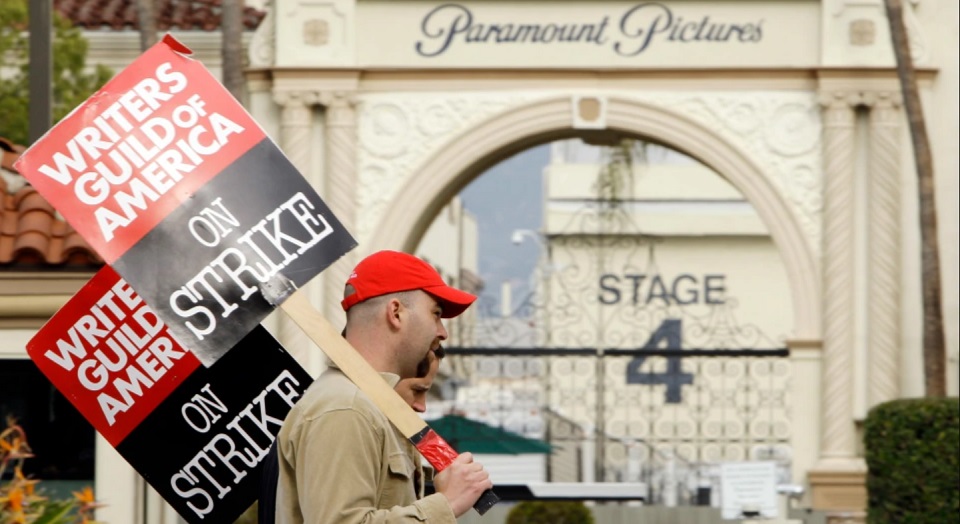
HOLLYWOOD, Calif.—Streaming video may be streaming money to Amazon, Apple, Disney and Netflix, but it isn’t trickling down to the writers of those videos’ scripts, who voted 98.3%-1.7% (9,020-198) to authorize their union, the Writers Guild of America, to call a strike. Turnout was a record 78.8%.
Pay is the key issue, but not the only one. A WGA report issued before the April 17 strike authorization vote shows that adjusted for inflation, a median writer’s income has fallen by 23% over the last decade. Combined, Hollywood-based WGA-West and New York-based WGA-East represent 11,000 writers and allied occupations.
“Our membership has spoken,” the WGA negotiating committee told members on the union’s website. “You have expressed your collective strength, solidarity, and the demand for meaningful change in overwhelming numbers. Armed with this demonstration of unity and resolve, we will continue to work at the negotiating table to achieve a fair contract for all writers.”
The Guild’s contract with the studios and bosses, the Alliance of Motion Picture and Television Producers (AMPTP), expires May 1. Bargaining began March 20. Talks resumed April 17.
But another issue is the bosses’ practice of setting up “mini-rooms,” which the Guild describes as “small, supplementary support writing rooms for a project.
“Because mini-room writers can be paid the minimum compensation, corporations have been exploiting this loophole to avoid paying producer or showrunner fees,” which augment writers’ income, the union explains.
Guild bargainers told their members a big margin for authorizing a strike “gives the negotiating committee leverage to make the best deal possible, and entrusts leadership with the power to declare a strike after contract expiration, if needed.” They got it.
The bargainers, led by co-chairs David Goodman and Chris Keyser and chief negotiator Ellen Stutzman, added the studios “only listened politely to our presentations and made small moves in a few areas, almost entirely coupled with rollbacks designed to offset any gains. In short, the studios have shown no sign they intend to address the problems our members are determined to fix in this negotiation.”
The union wants to solve those problems through “increasing minimum compensation significantly to address the devaluation of writing in all areas of television, new media and features, standardized compensation and residual terms for features” released in theaters or on streams, curbing the studios’ mini-room abuses and ensuring “appropriate television series writing compensation throughout entire process of preproduction, production and post production,” among other goals.
The studio bosses haven’t addressed “core economic issues” in the key types of production areas the writers create scripts for—comedy-variety, screen and episodic television—the union said. The Guild also wants any new contract to address pay equity, discrimination and sexual harassment on the job.
The studios responded they expected the Guild’s strike authorization vote. They charged, without proof, that WGA leaders were campaigning for the strike authorization before talks even began. It demanded the union “compromise” and “turn its attention to serious bargaining,” again without proving the union had not done so.
The writer-workers garnered strong and quick support from the leading news outlets in their home cities, the New York Times for WGA-East and the Los Angeles Times for WGA-West.
“If studios and platforms want to be in the original scripted content business, they need to make that business work for the people writing those scripts. It’s that simple,” tweeted Mary McNamara, the TV columnist for the Los Angeles paper. And its entertainment section added in a separate tweet: “AMPTP needs to stop screwing around and come to the table with reasonable responses to the WGA’s core demands for its new three-year contract before the old one expires on May 1.”
We hope you appreciated this article. Before you go, please support great working-class and pro-people journalism by donating to People’s World.
We are not neutral. Our mission is to be a voice for truth, democracy, the environment, and socialism. We believe in people before profits. So, we take sides. Yours!
We are part of the pro-democracy media contesting the vast right-wing media propaganda ecosystem brainwashing tens of millions and putting democracy at risk.
Our journalism is free of corporate influence and paywalls because we are totally reader supported. At People’s World, we believe news and information should be free and accessible to all.
But we need your help. It takes money—a lot of it—to produce and cover unique stories you see in our pages. Only you, our readers and supporters, make this possible. If you enjoy reading People’s World and the stories we bring you, support our work by donating or becoming a monthly sustainer today.










